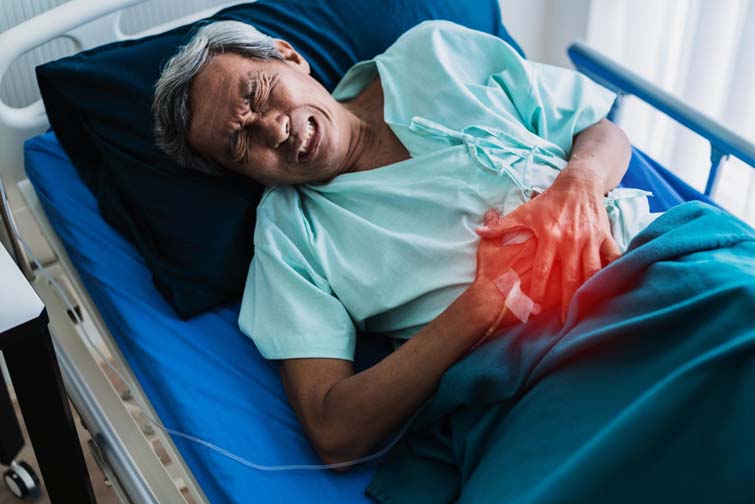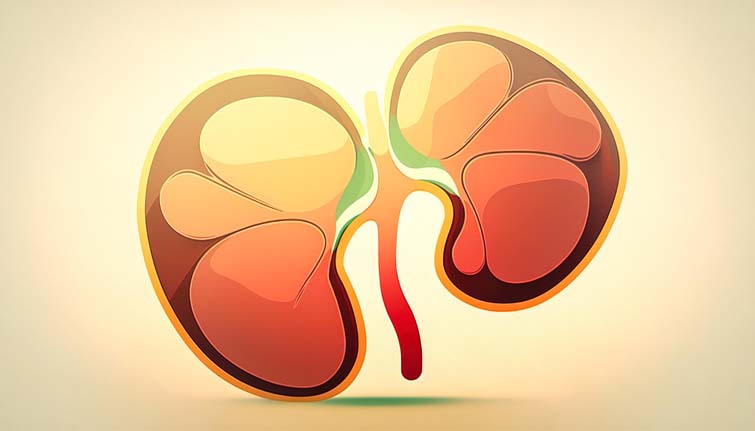
Kidney infections, also known as pyelonephritis, can be a serious medical condition that requires prompt attention and treatment. If you’re experiencing certain symptoms, it’s essential to seek urgent care in Bridgeport, CT, as kidney infections can lead to severe complications if left untreated. In this article, we will explore what kidney infections are, how they differ from urinary tract infections (UTIs), their associated symptoms, their bacterial causes, and the risk factors that increase your likelihood of developing one. Additionally, we’ll discuss the severe complications that can arise from a kidney infection.
A kidney infection is a serious medical condition that requires urgent care in Bridgeport, CT, when symptoms arise. It occurs when bacteria enter the kidneys, causing inflammation and infection. Urgent care is crucial because if a kidney infection is left untreated, the infection can rapidly spread from the lower urinary tract to the kidneys, leading to severe complications. Seeking immediate medical attention at a reliable urgent care center in Bridgeport, CT, is essential to receive prompt diagnosis and appropriate treatment to prevent further escalation of the infection and promote a speedy recovery.
Kidney infections are often mistaken for urinary tract infections (UTIs), but it’s important to understand their differences. While UTIs typically involve the bladder (resulting in cystitis) or the urethra (leading to urethritis), a kidney infection specifically targets the kidneys. Symptoms of UTIs generally include discomfort and pain during urination, frequent urination urges, and cloudy or blood-tinged urine.
In contrast, kidney infections manifest more severe symptoms, often accompanied by high fever, back pain, and chills. Professional advice from a reputable local urgent care center in Bridgeport, CT, may be necessary to diagnose these conditions properly.
In the early stages, a kidney infection may present mild symptoms that can be mistaken for a common UTI. These mild symptoms may include:
Experiencing a frequent and urgent need to urinate could signal the early stages of a kidney infection. Pay attention to this symptom, and don’t hesitate to seek professional care in Bridgeport, CT, especially if it’s persistent or accompanied by other signs. While many individuals might mistake this for a simple UTI, it’s vital not to dismiss it lightly, as it could signal a more serious condition like a kidney infection.
Experiencing pain or a burning sensation during urination is a typical symptom of both UTIs and kidney infections. However, if this discomfort accompanies other mild symptoms mentioned earlier, you might be dealing with a kidney infection. You must seek urgent care in Bridgeport, CT, when these symptoms surface for an accurate diagnosis and immediate treatment.
Changes in the appearance and odor of urine, such as cloudiness or a foul smell, may be an early indication of a kidney infection. Though it can be easy to dismiss such changes, especially if they don’t cause pain or discomfort, it is essential to prioritize your health and visit centers for urgent care in Bridgeport, CT. Care centers can quickly analyze a urine sample to determine if there’s an underlying infection, such as a kidney infection. Early detection through urgent care in Bridgeport, CT, can lead to timely treatment, reducing the risk of complications and ensuring a smooth recovery.
Mild lower back pain or abdominal discomfort is another symptom that can be associated with kidney infections. While such pain can be attributed to various factors, it’s crucial not to ignore it, particularly if you experience other mild symptoms listed above. Urgent care centers in Bridgeport, CT, are well-equipped to assess your condition and provide appropriate medical attention.


As the kidney infection progresses, the symptoms can become more severe and may include:
As a kidney infection advances, one of the most concerning symptoms is the development of a high fever. A fever is the body’s natural response to an infection and indicates that the immune system is actively fighting off the invading bacteria. However, a persistently high fever above 101°F can indicate the infection is spreading and becoming more severe. In such cases, seeking urgent care in Bridgeport, CT, is essential. High fevers can lead to dehydration and other complications, and a center for urgent care in Bridgeport, CT, can provide immediate medical attention, perform necessary tests, and administer appropriate medications to bring the fever under control and manage the underlying kidney infection.
Severe back pain is a hallmark symptom of a kidney infection. The pain usually concentrates on one side of the lower back, right where the affected kidney is. This pain can become sharp and intense, hindering your ability to carry out daily activities. If you experience severe back pain along with other symptoms of a kidney infection, it’s crucial to visit an urgent care facility without delay. Trusted centers for urgent care in Bridgeport, CT, have the expertise and resources to evaluate the severity of the pain, conduct relevant imaging studies, and initiate prompt treatment to alleviate the discomfort and address the underlying kidney infection.
Chills and shaking often accompany a high fever and indicate a significant infection. When experiencing chills and shaking with other severe kidney infection symptoms, seeking urgent care is paramount. These symptoms suggest that the infection impacts the body’s temperature regulation, and medical attention is necessary to prevent further complications.
The progression of a kidney infection can lead to gastrointestinal symptoms such as nausea and vomiting. These symptoms can significantly impact a person’s well-being and cause dehydration and electrolyte imbalances. Visiting an urgent care facility is crucial if you experience persistent nausea, vomiting, and other severe kidney infection symptoms. Urgent care providers can assess your condition, administer fluids to rehydrate the body, and prescribe medications to alleviate nausea and vomiting.
A kidney infection can take a toll on the body, leading to extreme fatigue and weakness. As the infection progresses, the body’s immune response and the presence of toxins can cause feelings of exhaustion. Find yourself experiencing severe fatigue, weakness, and other symptoms of a kidney infection. Urgent care can provide the necessary support and treatment. Centers for urgent care in Bridgeport, CT, can conduct blood tests to check for abnormalities and provide appropriate medical care to help the body recover and regain strength.
In severe cases of kidney infection, especially in the elderly or those with weakened immune systems, the infection can lead to mental confusion or changes in consciousness. These neurological symptoms require immediate medical attention. Urgent care centers are equipped to assess cognitive function, provide necessary interventions, and ensure the patient’s safety. Early detection and urgent care in Bridgeport, CT, can prevent the condition from worsening and improve the chances of a successful recovery.

Most kidney infections are caused by bacteria entering the urinary tract and reaching the kidneys. Here are some of them:
Escherichia coli, commonly known as E. coli, is the leading cause of kidney infections. This bacterium normally resides in the intestines and is crucial in maintaining gut health. However, certain strains of E. coli can cause infections when they enter the urinary tract and ascend to the kidneys. This is more common in women due to their shorter urethra, which provides an easier pathway for bacteria to reach the bladder and kidneys.
E. coli-related kidney infections can be particularly problematic as these bacteria can adhere to the urinary tract walls, making it difficult for the body’s immune system to clear the infection. Prompt treatment with appropriate antibiotics is essential to eradicate E. coli and prevent the infection from spreading further.
Klebsiella is another type of bacteria that can cause kidney infections. This bacterium is part of the normal human mouth, skin, and intestines flora. However, when it enters the urinary tract and reaches the kidneys, it can lead to inflammation and infection. Klebsiella infections are more commonly associated with healthcare settings, especially in individuals with compromised immune systems or those who have undergone invasive medical procedures.
Pseudomonas is a group of bacteria that can cause various infections, including kidney infections. It is commonly found in soil, water, and moist environments. Pseudomonas infections of the kidneys can occur in individuals with underlying health conditions, such as diabetes or those with weakened immune systems. Pseudomonas-related kidney infections can be challenging to treat due to their ability to develop resistance to multiple antibiotics.
Enterococcus is a type of bacteria that is commonly found in the gastrointestinal tract. While it typically does not cause harm in its usual location, it can lead to infections when it enters the urinary tract and migrates to the kidneys. Enterococcus-related kidney infections can occur in individuals with urinary tract abnormalities or those with weakened immune systems. These infections can be persistent and difficult to treat, requiring specific antibiotics that are effective against Enterococcus. Urgent care in Bridgeport, CT, is necessary to diagnose and manage Enterococcus-related kidney infections promptly, preventing complications and ensuring a successful recovery.

Several factors can increase the risk of developing a kidney infection, including:
Women are at a higher risk of developing kidney infections due to their anatomical differences. The female urethra is shorter than that of males, meaning bacteria have a shorter distance to reach the bladder and potentially ascend to the kidneys. Additionally, the urethra in females is closer to the anus, increasing the chances of bacteria from the intestinal tract entering the urinary system. As a result, women are generally more prone to urinary tract infections (UTIs). If left untreated, these UTIs can progress to kidney infections.
Any condition obstructing or blocking urine flow through the urinary tract can increase the risk of developing a kidney infection. Kidney stones, which are hard mineral and salt deposits formed in the kidneys, can obstruct urine flow and create an environment where bacteria can thrive. Similarly, an enlarged prostate in men can compress the urethra and hinder urine flow, making it easier for bacteria to accumulate and cause infections.
Individuals with compromised immune systems are more vulnerable to kidney infections. Conditions that weaken the immune system, such as diabetes, HIV, or undergoing immunosuppressive treatments, can make it difficult for the body to fight off bacteria that enter the urinary tract. As a result, infections may develop and progress more rapidly in immunocompromised individuals. Such individuals must be vigilant about their overall health, manage their underlying conditions effectively, and seek urgent care in Bridgeport, CT, if they suspect a kidney infection to prevent potential complications.
Urinary catheters are medical devices used to drain urine from the bladder when a person cannot urinate normally. While they are necessary in certain medical situations, catheters also pose an increased risk of introducing bacteria into the urinary tract, leading to infections. The longer a catheter remains in place, the higher the likelihood of bacterial colonization and infection. Patients with catheters should be vigilant for signs of infection, such as increased pain or cloudy urine, and promptly report any concerns to their local center for urgent care in Bridgeport, CT.
Hormonal changes during pregnancy can impact the urinary system, leading to an increased risk of kidney infections. As the uterus expands, it can compress the ureters, which are the tubes that carry urine from the kidneys to the bladder. This compression can impede normal urine flow and create a conducive environment for bacterial growth. Additionally, pregnancy hormones can relax the urinary tract muscles, further slowing down urine flow and increasing the risk of infections.

Without prompt and appropriate treatment, kidney infections can lead to severe complications, including:
This is an uncommon yet highly serious condition in which the kidney tissue becomes infected, accumulating gas within the kidney. This gas buildup creates air pockets, causing the kidney to appear “emphysematous” on medical imaging. The condition is life-threatening and demands urgent medical attention. If not promptly addressed, emphysematous pyelonephritis can rapidly progress, causing widespread kidney damage and complications.
In severe cases, the infection can spread systemically, leading to sepsis — a potentially fatal condition marked by a severe body-wide inflammatory response. Immediate and assertive medical treatment, often involving surgical intervention to drain the gas and infected tissues, is crucial to halt further tissue destruction and reduce the risk of life-threatening complications.
This is a severe complication of kidney infection characterized by the death of the renal papillae, the delicate structures at the tips of the kidney’s collecting ducts. Infection and inflammation can disrupt the blood flow to the papillae, leading to necrosis. As a result, the affected papillae lose their functionality, and their death can compromise kidney function. In severe cases, renal papillary necrosis can cause significant impairment of kidney function or even kidney failure. The condition may require extensive medical management, including intravenous antibiotics to control the infection and supportive measures to preserve kidney function. Early diagnosis and urgent care in Bridgeport, CT, are crucial in preventing the progression of renal papillary necrosis and minimizing long-term damage to the kidneys.
Urgent care in Bridgeport, CT, is vital in providing timely and accessible medical care for various health conditions, including kidney infections. Kidney infections can escalate quickly and lead to severe complications if not treated promptly. Centers for urgent care in Bridgeport, CT, offer a convenient and efficient option for individuals seeking immediate medical attention for kidney infections. Here are some of the treatment methods that urgent care centers may employ when managing kidney infections:
Upon arrival at a center for urgent care in Bridgeport, CT, patients with suspected kidney infections will undergo a thorough evaluation. Healthcare providers will take a detailed medical history, inquire about symptoms, and perform a physical examination. Additionally, they may order urine tests, such as urinalysis and urine culture, to identify the presence of bacteria and assess kidney function. Imaging studies, such as ultrasound or CT scans, may also be conducted to evaluate the kidneys’ structure and identify any complications.
Antibiotics are the mainstay of treatment for kidney infections caused by bacterial pathogens. Based on the results of urine tests, healthcare providers at local centers for urgent care in Bridgeport, CT, will prescribe appropriate antibiotics to target the specific bacteria responsible for the infection.
Kidney infections can cause significant discomfort, particularly in the lower back or abdomen. Centers for urgent care in Bridgeport, CT, may provide pain management options to alleviate the patient’s discomfort. Non-steroidal anti-inflammatory drugs (NSAIDs) or other pain medications may be prescribed to help manage pain and inflammation.
Dehydration can often accompany kidney infections, especially if the patient has been experiencing frequent and urgent urination. Centers for urgent care in Bridgeport, CT, may administer intravenous fluids to rehydrate the patient and support kidney function.
After initiating treatment, the center for urgent care in Bridgeport, CT, will closely monitor the patient’s progress to ensure the infection responds well to antibiotics. If necessary, they may schedule follow-up appointments to assess the patient’s recovery and kidney function. Follow-up care is essential to prevent potential complications and ensure complete resolution of the infection.
In some cases, kidney infections may be complicated or persist despite initial treatment. Centers for urgent care in Bridgeport, CT, may refer patients to urologists or nephrologists, specialists in treating kidney and urinary tract disorders, for further evaluation and management.
DOCS Medical Group is a highly reputable and trusted center for urgent care in Bridgeport, CT, offering comprehensive medical services to individuals in need of immediate healthcare attention. With a team of experienced and compassionate healthcare professionals, we are committed to providing top-notch care for various medical conditions, including kidney infections.
Take charge of your health and contact the best center for urgent care in Bridgeport, CT, today to receive the immediate medical attention you need to safeguard against potential complications and promote a swift recovery.

During this surge in COVID-19 cases, our primary focus is meeting the high demand for tests, and we are seeing higher than usual wait times. This means we are unable to answer most phone calls. Please know that our teams are working very hard during this time to care for as many patients as safely as possible. Please click the button below for answers to common questions. We appreciate your understanding.